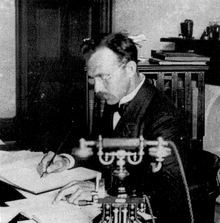William Ernest Cooke
| William Ernest Cooke | |
|---|---|

Cooke in 1909
|
|
| Born | 25 July 1863 Adelaide |
| Died | 7 November 1947 (aged 84) Adelaide |
| Nationality | Australian |
| Occupation | Astronomer |
William Ernest Cooke (25 July 1863 – 7 November 1947), generally referred to as "W. Ernest Cooke" or informally "Ernest Cooke", was an Australian astronomer, credited with a number of important scientific breakthroughs and improved methodologies in astronomical observations and star cataloguing. He was the first Western Australian Government Astronomer and established the Perth Observatory as one of the best equipped and productive establishments of its type in Australia.
Cooke was born in Adelaide, the son of Ebenezer Cooke, public servant and politician from South Australia. He was educated at The Collegiate School of St Peter in Adelaide (1875–79) and the University of Adelaide (B.A., 1883; M.A., 1889).
Cooke did well at school: in 1879 he was first placed in St Peter's First Class of matriculants, with passes in Greek and Chemistry. He signed the student roll at the University of Adelaide in March the same year, while he was still 15. After a glowing reference from his headmaster, he took a Civil Service cadetship under Sir Charles Todd at the Adelaide Observatory in December 1878. He was awarded a Bachelor of Arts degree in 1883 and a Master of Arts in 1889.
Cooke married Jessie Elizabeth Greayer in Adelaide in 1887 and they had six children—five before arriving in Western Australia: Violet Ogden (1888), Lionel Ernest (1889), Rosalie (1891, died in infancy), Frank Basil (1892), and Erica Carrington (1894). The sixth child, Maxwell Greayer was born in Perth in 1898.
In about 1882 he was appointed as senior assistant, second class at the Adelaide Observatory.
In the mid-1890s, Todd was advising the Premier of Western Australia Sir John Forrest who wanted to build a high quality Perth Observatory in Western Australia. In December 1894 he wrote to Forrest advising that the £3,000 which had been set aside in the budgets for construction was sufficient and would be adequate for the purchase of instruments also. A site was chosen and endorsed by Todd during a one-week visit to Perth in July 1895. With regards to an astronomer, Todd wrote:
...
Wikipedia
